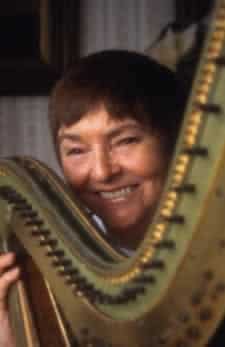Death of a harp titan
mainWe’ve been informed of the death of Ann Griffiths – Welsh harpist, harp historian, composer, teacher and editor – in her mid-80s.

After graduating in Welsh at Cardiff University, she obtained a Premier Prix of the Paris Conservatoire in the class of the legendary Pierre Jamet – the first British-born harpist ever to do so. Later she graduated as a Master of Arts in Musicology from the University of Birmingham. As a performer, her major interest is in historical harps, and she is passionate about the harp music of John Parry, Krumpholtz, Dussek, Parish Alvars, John Thomas and N.C. Bochsa. She has written extensively for various scholarly publications including the New Dictionary of National Biography and the New Grove Music Dictionaries, where she was responsible for 46 entries, including a completely new major article on Sebastian Erard. At present her main scene of activity is Adlais Music Publishers, of which she is Director. She is a member of the Board of Governors of the World Harp Congress and former Chairman of the Lady Llanover Society.





Roedd hi’n delynores ac ysgolhaig coeth iawn. Boed iddi orffwys mewn heddwch.
Her articles and Xavier de Meistre’s superb records helped introduce ihe outstanding music of harpist-composer Henriette Renie’s concerto , sonata. fantasia, some of its most virtiosic.
The Welsh harp is symbolic of fabled Welsh bards who defied Edward’s army in the Border Wars, as depicted in a dramatic painting “The Bard” by turner’s friend John Martin. Sibelius’s tone-poem is an apt accompaniment along with Beecham’s “En Saga” and Leon Goossens’s unmistakable oboe sith the LPO..
I virst glimpsed John Martin’s painting of “The Bard”” through several open doors at a Wordsworth exhibit and was dumbstruck as much by it as by Keas’s and Wordsworth’s mss. including “stougt Cortez” rather than Balboa discovering the Pacific in Panama, quite a find, that, “eyes wide with all amaze / Silent upon a peak in Darien.” It’s one of history’s endearing blunders, boldly written without faltering or erasure, and oddly comforting yo a fallible poster.
Mozart famously disliked the flute and harp but wrote his concerto for both, behaving himself until the last page where he wrote three things then impossible on the harps of his day, giving igs first players a nasty turn.